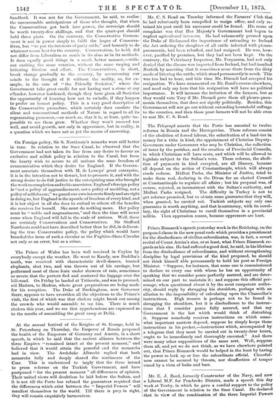Prince Bismarck's speech yesterday week in the Reichstag, on the
proposed clause in the new penal code which provides a punishment for the disobedience of civilian subordinates, was, in fact, a covert recital of Count Arnim's sins, or at least, what Prince Bismarck re- gards as his sins. He had suffered a-good deal, he said, in his lifetime from the disobedience of subordinates, and without strengthening discipline by legal provisions of the kind proposed, he should not think himself able permanently to hold his post as Foreign Minister. " Suppose, for instance, that some one is commissioned to declare to every one with whom he has an opportunity of speaking that we consider peace perfectly assured, and are deter- mined on our part to maintain it ; and suppose this official per- sonage, when questioned about it by the most competent autho- rity, should reply by shrugging his shoulders, perhaps with an allusion to the impossibility of calculating upon the Chancellor's instructions. High treason is perhaps not to be found in shrugging the shoulders, but it is disobedience to the instruc- tions that I consider peace fully assured, and that my Government is the last which would think of disturbing it. Suppose somebody receives instructions on which some- what important matters depend, suppose he simply keeps these instructions in his pocket,—instructions which, accompanied by a telegram that they must be carried out in twenty-four hours, ought to be immediately and thoroughly executed." And there were many other suppositions of the same sort. Well, suppose them all, and yet we do not think, as we have elsewhere pointed out, that Prince Bismarck would be helped in the least by having the power to lock up or fine the subordinate official. Cheerful- ness cannot be secured by threats, nor disaffection of temper cured by a vista of bolts and bars.






































 Previous page
Previous page